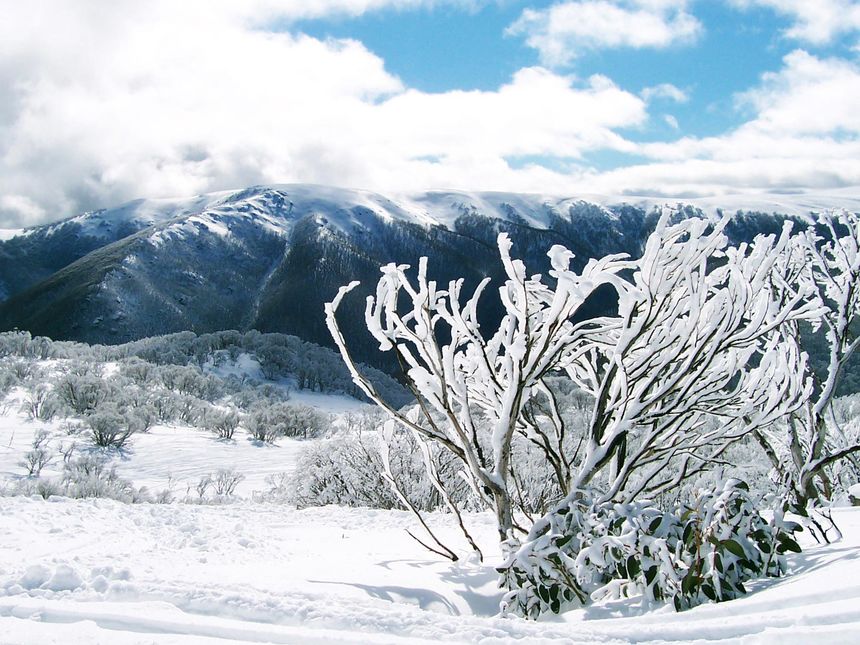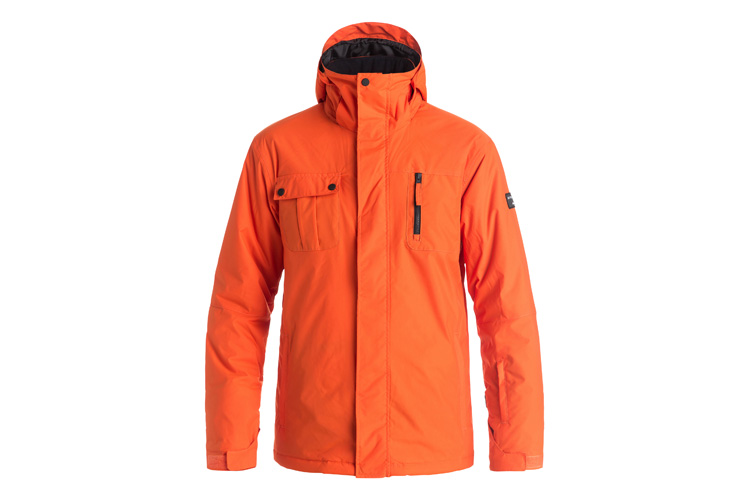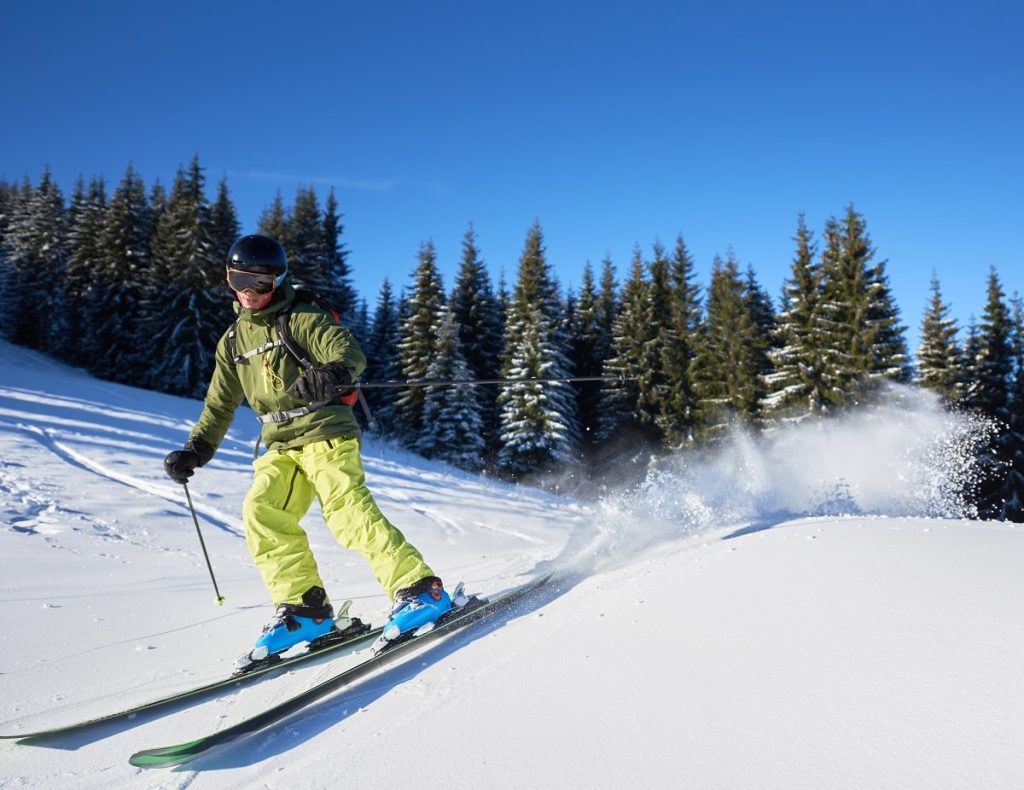
A good ski jacket will keep the snow from blowing, rain or shine. We have compiled our top picks of the best lightweight ski jackets. These range from affordable options that offer almost perfect warmth and performance to higher-end options that improve comfort, fit and tailoring.
Warm conditions: The best lightweight ski jackets
Look for jackets that combine premium waterproofing with synthetic insulation to achieve the best combination of warmth and breathability. Synthetic insulation doesn't lose its warmth in the rain unlike down. And they're very easy to keep clean. This type of design will keep the temperature down on those spring and winter days when it is more likely that your body temperature will spike.
Lightweight ski jackets made from a mix of natural and recycled fabrics are the best. Many have recycled polyester linings, as well as DWR coatings that are free from PFCs. These fabrics are sustainable and bluesign approved. They're Fair Trade Certified sewn.

A blend of synthetic wool and wool makes lightweight ski jackets that are comfortable and soft. Others are insulated using PrimaLoft ThermoPlume insulation. This recycled fiber mimics down while retaining synthetic's ease-of-maintenance.
A good ski jacket must be breathable in order to regulate body temperature and prevent heat buildup. This typically means a jacket with an underarm vent or pit zip that allows you to adjust the airflow.
A jacket with thumb holes can regulate your body's temperature. This can come in handy when you need extra warmth or your gloves. This is particularly helpful for those who spend long hours in the cold, such as those in ski patrol or working in a backcountry resort.
You will find the best lightweight ski jackets with multiple pockets that can accommodate everything from ski passes and goggles to credit card. Some jackets even have mesh hanging pockets which are useful for storing gloves and skis between runs or when hiking.

Other features that will enhance your comfort include a hood with a helmet-compatible design, pit zips that provide easy access to your gloves or goggles, and hand-warming pockets. A chest pocket is a great place to stash your goggles and other small gear, while a dedicated pass pocket will make catching a chairlift down to base easier.
The best ski jackets for winter are made with a mix of synthetic insulation and premium waterproofing such as a Goretex membrane. Although these jackets are more expensive than non-insulated ones, they provide a better combination of warmth as well as functionality.
PrimaLoft ThermoPlume insulation is the best option for those who ski in cold weather. It uses a recycled fiber that imitates down's performance but maintains its ease-of-care.
FAQ
What snacks can I take on a plane?
You can choose from many types of snacks when you fly. It is a good idea to bring along any food you love while you travel.
You could pack, for instance, chocolates and other chocolate-related treats.
For something more savory, you might want to pack cheese or crackers.
It is also important to consider the type of beverages you'd like to bring onboard. You might prefer something hot or cold.
Whatever type of snack or drink you decide to bring along, make sure they are all packed safely and securely.
This will ensure that your belongings are safe during transport.
How can I prepare myself for vacation?
To maintain a healthy lifestyle on vacation, you must eat well and exercise regularly.
You should also ensure you are well rested and hydrated before leaving home.
You should ensure you have all necessary travel documents and medication ready for when you go.
And if you're planning to take any medication during your trip, ensure you carry enough to last until you return home.
Make sure you bring a change of clothes in the event that you are injured or get sick.
You should not forget these things when you travel.
You will find yourself in situations that leave you with very little time for making decisions when you travel. It's okay to be spontaneous.
It is possible to be stuck anywhere for hours, days or even weeks. If you plan ahead, you will have food, water and shelter. You may need to improvise if you don't plan ahead.
In these cases you will need to rely on your best skills. You will have to rely on your instincts and experience to make quick decisions.
Sometimes you just can't make a choice. For example, you could be stranded in an area without cell phone service, running out of gas, or having been robbed. You'll need to adapt quickly to these situations.
You must remain calm, be focused and take decisive action. Don't panic. Instead, focus on what you can control.
For example, if you're lost in the woods, you can choose which direction to go. If you feel hungry, you have the option to eat berries or mushroom. Rainwater or melting snow are good options if you're feeling thirsty.
Rest if your tired. You can wrap up if you're cold. If you get wet, you can put on clothes. Whatever you decide, you'll feel better if you stay positive.
Statistics
- Alcoholic beverages with more than 24% but not more than 70% alcohol are limited in checked bags to 5 liters (1.3 gallons) per passenger and must be in unopened retail packaging. (tsa.gov)
- Case in point: the private island of Ilha Caldeira, less than seven miles off the coast as part of the Primeiras and Segundas Archipelago, is located within the marine-protected area with 20 percent of the country's intact living coral. (travelandleisure.com)
- No Checked Bags: No Alcoholic beverages with more than 70% alcohol (over 140 proof), including grain alcohol and 151 proof rum. (tsa.gov)
- According to Maori legends, this park holds 14 fjords that were all carved by a giant stonemason with an adze. (busytourist.com)
- Alcoholic beverages with 24% alcohol or less are not subject to limitations in checked bags. (tsa.gov)
External Links
How To
What are the best travel tips for beginners?
While traveling is an exciting experience there are many traps that you must avoid in order to enjoy a safe and enjoyable trip.
These are some basics to help you plan your next trip.
-
Make sure to book early. The price of a booking is lower if it's made in advance. You can also save money by not taking advantage of last-minute deals offered to you by hotels or airlines.
-
Stay-at-budget accommodations. You get more for your money in cheap hotels. They are usually close to public transport and shopping centers.
-
Don't overpack. Make sure to pack light. Make sure you have enough space for souvenirs and other gifts. Make sure you bring clothes that fit well and don’t wrinkle easily.
-
Be sensible. Don't wander around at night if you are traveling solo. Avoid dangerous neighborhoods and areas with high levels of crime.
-
You can take precautions to prevent theft. Keep valuables away from prying eyes. Swimming is a great way to keep valuables safe.
-
Pay attention to cash. Thieves often target tourists in foreign cities. Keep your money safe and use ATMs only in banks or secured locations.
-
You need to know what you are doing. Prior to booking a room in a hotel, make sure you understand how public transport works. Find out about tourist attractions, restaurants, and other sights.
-
Learn about safety. Learn about the culture, customs, laws and traditions of the area before you arrive.
-
Have fun. Enjoy it, no matter how difficult. It's worth it.